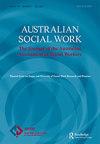第一民族儿童和家庭与永久计划改革:证据计数
IF 2
3区 社会学
Q2 SOCIAL WORK
引用次数: 1
摘要
在2012年至2022年期间,新南威尔士州(NSW)的户外护理(护理)系统面临着第一民族强烈而持续的反对,主要的永久性计划改革改变了该系统。永久性、依恋和相关概念,包括儿童的最大利益,都是永久性规划的核心概念,也是关于儿童永久性照料安排的司法决策的关键因素。作为一名Wiradjuri法律学者,作者进行了博士研究,探讨了土著社区成员对这些概念的理解。本文以恢复为重点,对新南威尔士州实施的立法变化方面进行了批判性评论。作者在概述与改革有关的文献时指出,从第一民族的角度来看,大量缺乏支持所作立法改革的证据。讨论了对第一民族和社会工作的影响。这篇文章试图促使社会工作者反思,这种证据真空是如何对受法定照料的第一民族儿童和年轻人造成伤害的。儿童福利和相关奖学金中的社会工作领域必须以第一人民的知识和经验为中心。如果不这样做,关键的概念和实践相关问题将仍然难以理解,对第一民族儿童和家庭造成的与儿童福利制度有关的深刻创伤将永远存在。与第一民族儿童和青年的长期照料安排有关的制度改革必须以第一民族主导的证据为基础,包括永久性和依附关系方面的证据,并且必须以第一民族的观点和生活经验为中心。了解和考虑到第一民族的观点是社会工作者和其他非土著背景的从业人员在支持参与照料事务的第一民族儿童和家庭时必须采取的一项重要行动。因此,有必要在社会工作领域对儿童保护政策和立法如何有利于或伤害第一民族社区进行批判性反思。当政府提出的政策被第一民族视为不利于支持第一民族儿童的长期福祉时,倡导制度变革是社会工作者可以采取的重要行动。本文章由计算机程序翻译,如有差异,请以英文原文为准。
First Nations Children and Families and Permanency Planning Reform: The Evidence Counts
ABSTRACT Major permanency planning-based reforms transformed the New South Wales (NSW) out-of-home care (care) system between 2012 and 2022, in the face of strong, sustained opposition from First Peoples. Permanency, attachment and related notions, including the best interests of the child are all constructs central to permanency planning and crucial factors in judicial decision-making about children’s permanent care arrangements. Doctoral research conducted by the author, a Wiradjuri legal scholar, explored Aboriginal community member understandings of these concepts. With a focus on restoration, this article provides a critical commentary on aspects of the legislative changes implemented in NSW. Outlining literature relating to the reforms, the author notes the substantial lack of evidence from First Nations’ perspectives in support of the legislative changes made. Implications for both First Peoples and for social work are discussed. The article seeks to prompt reflection by social workers on how such evidence vacuums can cause harm to First Nations children and young people in statutory care. Social work spheres within child welfare and associated scholarship must centre First Peoples’ knowledge and experiences. If not, crucial conceptual and practice-related issues will remain poorly understood and profound child welfare system-related trauma caused to First Nations children and families will be perpetuated. IMPLICATIONS System reform relating to permanent care arrangements of First Nations children and young people must be grounded in First Nations-led evidence, including on permanency and attachment, and it must centre First Peoples’ perspectives and lived experience. Understanding and taking into account the perspectives of First Peoples is an important action social workers and other practitioners from non-Indigenous backgrounds must take in supporting First Nations children and families involved in care matters. Hence, there is a need for critical reflection in the social work sphere, about how child protection policies and legislation may benefit, or create harm to, First Nations communities. Advocacy for systems change is an important action social workers can take, when governments propose policies that First Peoples view as detrimental to support the long-term wellbeing of First Nations children.
求助全文
通过发布文献求助,成功后即可免费获取论文全文。
去求助
来源期刊

Australian Social Work
SOCIAL WORK-
CiteScore
4.20
自引率
16.70%
发文量
37
期刊介绍:
Australian Social Work is an international peer-reviewed journal reflecting current thinking and trends in Social Work. The Journal promotes the development of practice, policy and education, and publishes original research, theoretical papers and critical reviews that build on existing knowledge. The Journal also publishes reviews of relevant professional literature, commentary and analysis of social policies and encourages debate in the form of reader commentary on articles. Australian Social Work has grown out of the Australian context and continues to provide a vehicle for Australian and international authors. The Journal invites submission of papers from authors worldwide and all contributors are encouraged to present their work for an international readership.
 求助内容:
求助内容: 应助结果提醒方式:
应助结果提醒方式:


